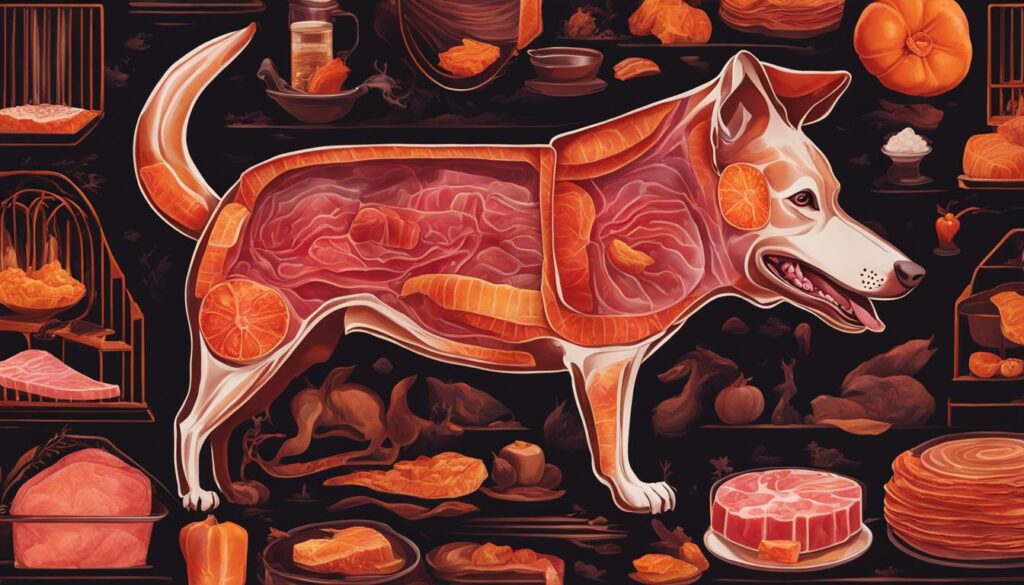Is it safe to share your delicious ham with your furry friend? Many dog owners wonder if dogs can eat ham, especially when they see those longing eyes begging for a taste. While ham may seem like a tempting treat, it’s essential to understand the potential risks associated with feeding your dog this salty and fatty meat.
When considering feeding dogs ham scraps, it’s crucial to take into account the sodium and fat content. Excessive sodium can be harmful to dogs, causing various health issues, including bloating and lethargy. Additionally, ham’s high fat content can lead to pancreatitis and digestive issues in our canine companions.
Store-bought ham also poses additional dangers. It often contains harmful preservatives that can be toxic to dogs, and the excessive sodium levels can have severe consequences on their health. So, before tossing that ham bone or offering a slice of deli ham to your dog, let’s explore the potential risks and guidelines to ensure their well-being.
Key Takeaways:
- While small amounts of ham are generally okay for dogs, it should be given in moderation.
- Excessive sodium in ham can lead to bloating and other serious health issues in dogs.
- The high-fat content in ham can cause pancreatitis and digestive problems in canines.
- Store-bought ham often contains harmful preservatives and excessive sodium levels that can be toxic to dogs.
- Consider low-sodium ham varieties and alternative protein sources for a balanced diet for your dog.
The Risks of Feeding Ham to Dogs
Feeding ham to your furry friend may seem like a harmless treat, but it’s important to be aware of the potential risks it can pose. Ham, particularly store-bought varieties, can contain high levels of sodium and fat, which can have adverse effects on your dog’s health.
The Dangers of Sodium in Ham for Dogs
Sodium is an essential mineral for dogs, but excessive intake can be toxic. Unfortunately, ham often contains high levels of sodium, which can lead to various health issues. Symptoms of excessive sodium intake in dogs can include excessive thirst, urination, diarrhea, vomiting, and lethargy. These symptoms can indicate sodium toxicity and should not be taken lightly.
The Impact of Ham Fat on Dogs
Ham is known for its higher fat content, which can be problematic for dogs. Consuming too much fat can lead to pancreatitis, a painful inflammation of the pancreas. It can also cause digestive issues such as diarrhea and vomiting. To safeguard your dog’s health, it’s essential to limit their consumption of high-fat foods like ham.
The Hazards of Ham Bones for Dogs
You may have heard that giving your dog a bone to chew on is beneficial for their dental health. However, when it comes to ham bones, caution is necessary. Feeding dogs ham bones, including leftover ones, can result in broken teeth, as well as esophageal or intestinal blockages. Cooked bones, in particular, are prone to splintering, which can cause serious harm to your furry friend.
Considering these risks, it’s best to avoid feeding ham to your dog altogether. Instead, focus on providing them with a well-balanced diet that includes lean meats, vegetables, and grains. By prioritizing your dog’s health and nutrition, you can ensure they lead a happy and healthy life.

The Dangers of Store-Bought Ham
When it comes to feeding ham to your furry friend, it is crucial to understand the potential risks associated with store-bought ham. While it may seem like a convenient option, deli ham can contain high levels of sodium and preservatives that can be harmful to dogs. The presence of pasteurized salts, phosphate, dextrose, sodium chloride, sodium nitrite, and sodium ascorbate in deli ham can cause toxicity and serious health issues in dogs.
Excessive sodium intake can be especially problematic for dogs, leading to symptoms such as increased thirst, urination, diarrhea, vomiting, and lethargy. It can also result in bloating and other serious health consequences. Therefore, it is important to exercise caution when offering deli ham to your canine companion.
| Ham Ingredient | Potential Health Risks |
|---|---|
| Pasteurized salts | Can cause toxicity in dogs |
| Phosphate | Can lead to imbalances in electrolytes |
| Dextrose | Can contribute to weight gain and diabetes |
| Sodium chloride | Can lead to sodium toxicity and high blood pressure |
| Sodium nitrite | Can be toxic and potentially carcinogenic |
| Sodium ascorbate | Can cause gastrointestinal upset and allergic reactions |
Considering the potential dangers associated with store-bought ham, it is advisable to explore alternative protein sources for your dog. Lean meats such as chicken or turkey can provide a healthier option while maintaining a balanced and nutritious diet. Your furry friend’s well-being should always be a priority, and making informed choices about their food can go a long way in ensuring their health and happiness.
Guidelines for Feeding Ham to Dogs
If you decide to offer ham to your dog, it is important to do so in moderation and take certain precautions to ensure their health and well-being. Here are some guidelines to consider:
1. Choose Low-Sodium Ham Varieties
To minimize the risks associated with excessive sodium intake, opt for low-sodium ham varieties when feeding it to your dog. These options contain lower levels of sodium, reducing the potential for sodium-related health issues. Check the packaging or inquire at your local deli to find low-sodium ham options that are safe for your furry friend.
2. Trim Excess Visible Fat
Before giving ham to your dog, make sure to trim off any excess visible fat. The high fat content in ham can lead to pancreatitis and other digestive issues in dogs. By removing visible fat, you can reduce the overall fat intake and minimize the risk of these health complications.
3. Explore Alternative Protein Sources
While ham can be enjoyed as an occasional treat, it is important to diversify your dog’s diet with other protein sources. Consider lean meats such as chicken or turkey as healthier alternatives to ham. These options provide essential nutrients and are generally lower in fat and sodium content than ham.
By following these guidelines, you can safely incorporate ham into your dog’s diet while minimizing potential health risks. Remember to consult with your veterinarian for personalized advice based on your dog’s specific health conditions and dietary requirements.

Table: Comparison of Ham and Alternative Protein Sources
| Protein Source | Fat Content (per 100g) | Sodium Content (per 100g) |
|---|---|---|
| Ham | 15g | 1000mg |
| Chicken Breast | 3.6g | 70mg |
| Turkey Breast | 1g | 60mg |
The Risks of Ham Bones for Dogs
When it comes to feeding ham to dogs, it’s important to be aware of the risks associated with giving them ham bones. While dogs may enjoy chewing on bones, ham bones can pose serious dangers to their health. Feeding ham bones to dogs can result in broken teeth, which can be painful and require dental intervention. Additionally, ham bones can cause esophageal or intestinal blockages, leading to severe discomfort and potentially life-threatening conditions.
Unlike raw bones, cooked bones, including ham bones, are more prone to splintering. These sharp fragments can cause injury to a dog’s digestive tract, leading to internal damage. Cooked bones can also become lodged in the esophagus or intestines, causing a blockage that may require surgical intervention to remove.
To ensure the safety and well-being of your furry friend, it is best to avoid giving ham bones altogether. Instead, provide your dog with safe and appropriate chew toys specifically designed for their dental health. These toys can help satisfy their natural urge to chew without the associated risks of bone fragments or blockages. Always consult with your veterinarian for guidance on appropriate chews and treats for your dog’s specific needs.
Expert Opinions on Feeding Ham to Dogs

Feeding dogs ham scraps is a topic that sparks debate among experts. While some argue that small amounts of ham may not cause harm, others emphasize the potential risks associated with ham consumption in dogs. It is important to consider these varying perspectives to make an informed decision about including ham in your dog’s diet.
“Feeding dogs ham scraps can be problematic due to the high fat and sodium content in ham. These can lead to digestive issues, pancreatitis, and other health concerns,” says Dr. Sarah Thompson, a renowned veterinarian with expertise in canine nutrition.
Deli ham, in particular, should be approached with caution when considering feeding it to dogs. The preservatives and high sodium levels in deli ham can be harmful to canine health. It is advisable to opt for healthier protein alternatives instead.
The Risks of Deli Ham for Dogs
In a study conducted by the Canine Nutrition Research Institute, it was found that deli ham contains up to 60% more sodium than fresh ham. This excessive sodium intake can cause bloating, dehydration, and kidney problems in dogs. Additionally, deli ham often contains preservatives, such as sodium nitrite, which have been linked to an increased risk of cancer in canines.
When considering feeding your dog ham, it is crucial to consult with your veterinarian for personalized advice based on your dog’s specific needs and health conditions. They can guide you in making the best choices for your furry friend’s diet and overall well-being.
Healthy Alternatives to Ham for Dogs
If you’re looking for alternatives to feeding ham to your dog, there are plenty of healthy options that can provide them with the necessary nutrients. Homemade dog food is a great way to control what goes into your pet’s meals and tailor their diet to their specific needs. Incorporating lean meats, vegetables, and grains can create a balanced and nutritious meal for your furry friend.
A simple recipe for homemade dog food can include cooked chicken or turkey, mixed with steamed vegetables like carrots and green beans, and a serving of brown rice or quinoa. This combination provides protein, vitamins, minerals, and fiber to support your dog’s overall health. Remember to consult with your veterinarian to ensure you’re meeting your dog’s specific dietary requirements.
In cases where your dog is sick or recovering from an illness, you may want to consider a bland diet that is gentle on their stomach. Boiled chicken or turkey mixed with plain white rice can be soothing and easily digestible for dogs with sensitive digestive systems. This combination helps provide nourishment and can help alleviate gastrointestinal issues.
| Healthy Alternatives to Ham for Dogs | Nutritional Benefits |
|---|---|
| Lean Chicken or Turkey | High-quality protein source |
| Steamed Vegetables (Carrots, Green Beans) | Provides vitamins and minerals |
| Brown Rice or Quinoa | Source of carbohydrates and fiber |
| Boiled Chicken or Turkey with Plain White Rice | Gentle on the stomach, easy to digest |
Remember, when introducing any new food to your dog’s diet, it’s important to do so gradually. Start with small amounts and monitor their response for any adverse reactions. Additionally, always consult with your veterinarian before making any significant changes to your dog’s diet.
Conclusion
So, can dogs eat ham? While it may be tempting to share a slice or two with your furry friend, it’s important to proceed with caution. Ham is high in fat and sodium, which can pose health risks for dogs if consumed in large quantities or on a regular basis.
Feeding ham to dogs should be done in moderation, as an occasional treat. It’s best to trim off any excess visible fat and opt for low-sodium ham varieties to minimize the potential risks. Remember, every dog is unique, so it’s important to consider their individual health conditions and dietary needs before introducing ham into their diet.
If you’re looking for alternative protein sources for your canine companion, consider lean meats like chicken or turkey. These options provide a healthier and balanced diet for your dog without the risks associated with ham. Remember, when it comes to your dog’s nutrition, consulting with a veterinarian is always a good idea to ensure you’re making the best choices for their well-being.
FAQ
Can dogs eat ham?
Ham is generally only okay for dogs in moderation due to its higher fat content. It is important to consider the potential health risks associated with a high-fat diet, such as pancreatitis and digestive issues.
What are the risks of feeding ham to dogs?
Excessive sodium in ham can be toxic for dogs, causing symptoms like excessive thirst, urination, diarrhea, vomiting, and lethargy. High-fat content in ham can lead to pancreatitis and other digestive issues. Feeding dogs ham bones can result in broken teeth and potentially life-threatening esophageal or intestinal blockages.
Is store-bought ham safe for dogs?
Store-bought ham often contains high levels of sodium and preservatives, which can be harmful to dogs. The presence of pasteurized salts, phosphate, dextrose, sodium chloride, sodium nitrite, and sodium ascorbate in deli ham can cause toxicity and serious health issues in dogs. It is important to exercise caution when offering deli ham to your furry friend.
How should ham be fed to dogs?
If you decide to offer ham to your dog, it should be in small quantities and trimmed of excess visible fat. Opt for low-sodium ham varieties to minimize the risks associated with excessive sodium intake. Additionally, explore alternative protein sources, like lean meats such as chicken or turkey, to maintain a balanced and healthy diet for your dog.
Are ham bones safe for dogs to chew on?
Feeding dogs ham bones, including leftover ham bones, can lead to broken teeth, esophageal or intestinal blockages, and internal damage. Cooked bones, in particular, are more prone to splintering and can be a choking hazard. It is best to avoid giving ham bones to dogs altogether to ensure their safety and well-being.
What do experts say about feeding ham to dogs?
Experts generally recommend avoiding feeding dogs high-fat and high-sodium meats like ham. While some argue that small amounts of ham may not cause harm, others point out the potential risks such as pancreatitis and digestive issues. Deli ham, in particular, should be approached with caution due to its preservatives and sodium content. Smoked ham should also be avoided due to the additional processing and potential health risks.
What are some healthy alternatives to ham for dogs?
Instead of feeding ham to your dog, consider incorporating other protein sources into their diet. Homemade dog food can be prepared with lean meats, vegetables, and grains, ensuring a balanced and healthy meal. If your dog is sick, consult your veterinarian for appropriate dietary recommendations, as specific health conditions may require individualized diets.
What is the conclusion about feeding ham to dogs?
While small amounts of ham can be shared with dogs as an occasional treat, it is important to be mindful of the potential health risks associated with its high fat and sodium content. Feeding ham to dogs should be done in moderation, considering their individual health conditions and dietary needs. It is always best to consult with a veterinarian for specific dietary guidance for your furry friend.





